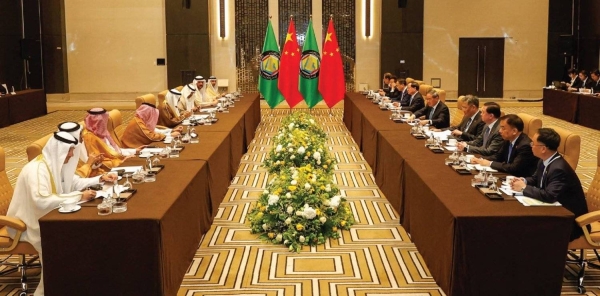The Gulf-Chinese talks held in Riyadh focused on various topics of common interest, with an emphasis on the developments in free trade negotiations between the Gulf Cooperation Council (GCC) countries and China. The session, co-chaired by Chinese Premier Li Qiang and GCC Secretary General Jasem Mohamed Albudaiwi, aimed to enhance cooperation between the two sides. Regional and international issues were also discussed, including the crisis in Gaza and the ongoing violations by the Israeli occupation forces against the Palestinian people. The Chinese side emphasized the need for a ceasefire and the implementation of relevant international and UN resolutions.
The discussions at the meeting revolved around ways to strengthen cooperation between the Gulf and China, building on their strong relations and shared interests. The outcomes of the first Gulf-Chinese Summit held in Saudi Arabia in December 2022 were also reflected in the talks. The focus was on enhancing cooperation in various fields to serve the mutual interests of both sides. The importance of implementing the Joint Action Plan for 2023-2027 was highlighted, with Albudaiwi underscoring the need to move forward and conclude the negotiations in the near future.
The Gulf and China have a longstanding relationship that continues to evolve, with both sides committed to deepening their cooperation. The talks in Riyadh provided a platform for discussing ways to further enhance this partnership and explore new opportunities for collaboration. The emphasis was on strengthening economic ties through free trade negotiations and implementing the Joint Action Plan, which outlines the roadmap for future cooperation between the two sides. The goal is to leverage the existing bilateral relations to achieve mutually beneficial outcomes.
The session also addressed regional and international issues of common concern, such as the crisis in Gaza and the Israeli-Palestinian conflict. Both the Gulf and China expressed their support for a ceasefire and the implementation of international resolutions to address the ongoing violations against the Palestinian people. By engaging in dialogue on these sensitive issues, the two sides demonstrated their commitment to promoting peace and stability in the region. The discussions underscored the shared values and principles that underpin the Gulf-Chinese partnership.
The talks in Riyadh underscored the importance of maintaining momentum in the negotiations and working towards tangible outcomes that benefit both the Gulf and China. By focusing on enhancing cooperation in various sectors, the two sides can unlock new opportunities for economic growth and development. The commitment to implementing the Joint Action Plan underscores a shared vision for the future and a commitment to working together towards common goals. As both sides continue to strengthen their ties, the potential for further collaboration and mutual benefits is significant.
Overall, the Gulf-Chinese talks in Riyadh were an important step towards deepening the partnership between the GCC countries and China. By addressing key issues of common interest and exploring ways to enhance cooperation, both sides demonstrated their commitment to strengthening their relations. The focus on economic ties, regional stability, and mutual interests bodes well for the future of the Gulf-Chinese partnership. With a shared commitment to building a stronger relationship based on cooperation and collaboration, the talks laid the groundwork for future cooperation and mutual benefit.











